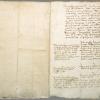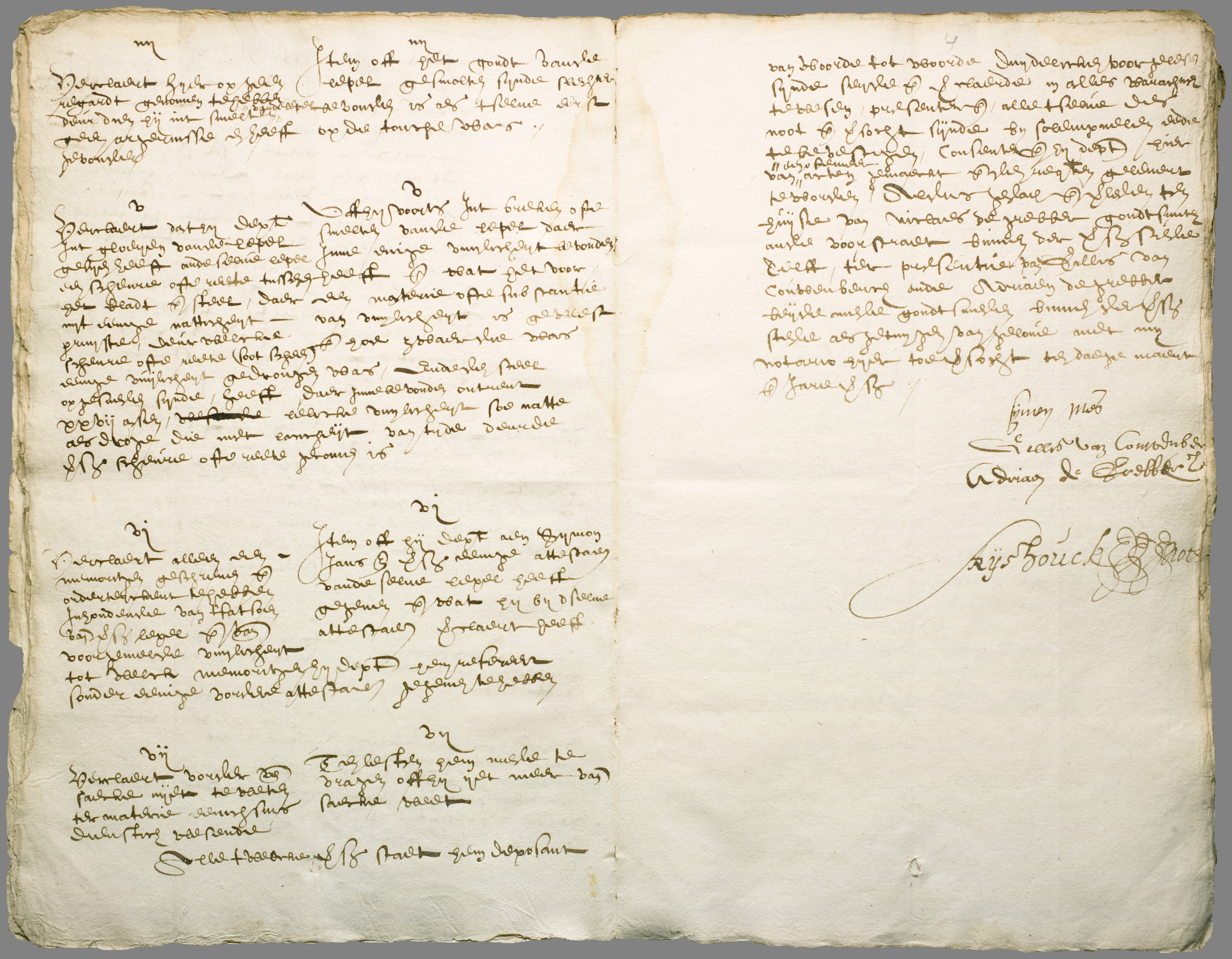
1609-Depositor-Goldsmith Guild
Reacties (10)
Dear Anne,
This is a formal statement deposited by Simon Mes to and report of an interrogation by the dean and sworn members of the Delft goldsmiths' guild on behalf of the dean and sworn members of the Utrecht goldsmiths' guild, apparently concerning a golden spoon bearing the arms of a general named Gramme van Hohenlo, delivered to Simon by the wife of Simon Janssz, who was the administrator of the aforementioned general. As this is only the first page of the statement, it is not et clear what the issue was Simon had to provide a formal statement about; that is probably mentioned at the next pages of this document.
After the introductory text, the interrogation texts are mentioned in the right column, Simon's responses to the respective questions were noted down in the left column.
From the introductory text, some details about Simon are known:
- he is burgher of Delft, so enjoying full citizen's rights and privileges;
- he is living at the north side of the Marktveld (currently: Markt) in Delft;
- he is a goldsmith;
- he is 'about 43 years of age' ('oudt ontrent XLIII jaren').
It may be interesting to upload the other pages of this document to see what was happening... ;)
Ah, just noticed page 2 ;)
Apparently, Simon was asked to melt the aforementioned spoon 'with a hollow handle on it'. It is not clear whether this was to melt it to down to a piece of gold or for repairing the spoon. He was asked whether he had found some inpurity while melting the spoon. He responded to have found a crack between the handle and the blade of the spoon, where some dirt ('both moist and dry') was found about 27 asen in weight (which is about 1.3 grams). He further stated to have written a short note about it that he handed over to Symon Janssz, the general's administrator.
The initial reason for this statement and interrogation unfortunately is not mentioned in this document, but from the context I suspect that the spoon probably was delivered to be repaired and apparently weighed less heavy when returned, perhaps causing the suspicion of the goldsmith Simon Mes to have 'scraped off' some of the gold in the process...
How fascinating! What a pity we don't have the full story.
Presumably it would not have been good for Simon's reputation as a burgher of Delft to have acted improperly?
On that point of being a burgher. Was it possible for someone born outside of Delft to become one?
It's believed that Simon's father Jasper Mes (quite a famous goldsmith in Delft) had fled from Antwerp like many other goldsmiths. Jasper registered in the Goldsmith Guild in Delft in 1586.
As we now know Simon was born around 1566 so it's possible that he also was born in Antwerp.
Thanks for all your help as always.
Anne
Hi Anne,
Such statements were quite common back then. As notaries belonged to the few people who were able to read, write and compose formal documents, notaries were far more often frequented by people than nowadays. Alleged improper behaviour by Symon would not have endangered his position as burgher or poorter rightaway; I think this statement was primarily intended to safeguard his position as trustworthy goldsmith and a trustworthy member of the goldsmiths' guild.
I am not entirely familiar with the 'poorterschap' concept in Delft, but I can imagine it was the same like in Amsterdam back then. In Amsterdam, there were three ways to obtain 'poorterschap':
- every son of a poorter in Amsterdam could obtain the poorterschap by pledging to serve and protect the city ('ingeboren poorters');
- persons from outside Amsterdam marrying the daughter or the widow of an Amsterdam poorter could also obtain the poorterschap by pledging to serve and protect the city ('behuwd poorters');
- persons from outside Amsterdam could also obtain the poorterschap by paying a substantial amount of money and pledging to serve and protect the city ('gekochte poorters').
It so happens that in December 2020 a question was posted at this forum about the criteria to become a poorter of Delft in 1780, see https://watstaatdaer.nl/forum/poorterboek-delft-%E2%80%93-deel-1
In short, in 1780 the criteria were:
- the person applying the poorterschap should not be indebted to anyone
- this person should also refrain from damaging any of the natural wilderness and fisheries belonging to the local lord(s)
- one should have a guarantor to guarantee payment of 5 guilders to the city of Delft in case the accepted poorter would abandon his poorterschap within the first five years
- the poorter should pledge an oath to: honour the Estates of Holland, honour the authorities of the city of Delft and to be faithfull towards these authorities, to honour and obey the city's privileges and charters, be obedient to the majors and rulers of the city and to act and behave as a good and faithful poorter ought to behave
Fascinating Rene.
As far as I can tell Simon didn't marry, although I haven't found marriage records for any of the brothers. Only baptisms of their children, giving the wife's name, then very often a document from the Orphan Chamber, and finally wills tie up each family.
The Mes(ch) family tree I'm creating keeps growing :-) and as we say all this extra information adds 'flesh to the bones' so they're not merely names and dates.
Eventually this family leads to the pottery industry in Delft and some of the women who ran them.....
warmest wishes
Anne
Also very interesting to see the different conditions applied in Delft in 1780.
I'd never thought to search the forum to see if an answer has already been given to my enquiry. Thanks for that tip.
best
Anne
Dear Anne,
Not finding a marriage certificate for either the Mes(ch) siblings does not automatically imply they weren't married. Registers on marriage (trouwregisters) and betrothal (ondertrouwregisters) were mandatory from 1563 onward and for a lot of towns and regions, the early registers were not preserved in the end.
Regarding the hit on the other WieWasWie: I cannot take the credit for finding it by myself, Google did: I used the terms Poorterboek and Delft and suddenly noticed the WieWasWie link in the search results ;)
Dear Rene
Where would we be without Google :-)
I've recently discovered that when I Google some of the names I'm interested in its search engine I find replies in English from my posts on 'Watstaatdaer.nl' comes up.
Yes I've assumed the early marriage records were perhaps lost. After about 1630 it seems much easier to find marriage details from the register.
Many thanks
Anne



Anne
zei op donderdag 30 januari 2025 - 13:02